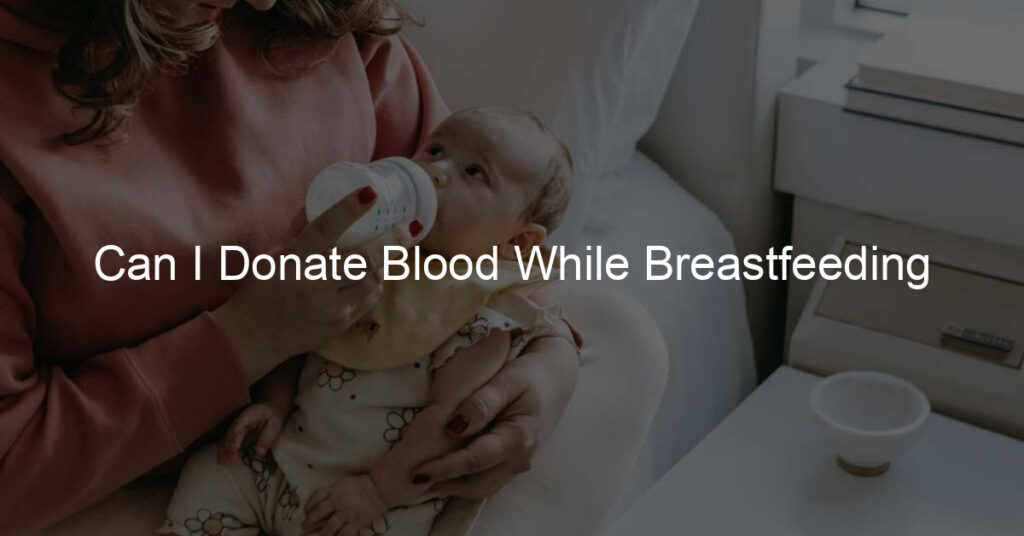Can I donate blood while breastfeeding? The answer may surprise you! While it is generally not recommended for women to donate blood while pregnant or breastfeeding, there are some circumstances where it may be permissible. Let’s take a closer look at the issue.
What happens if you donate blood while breastfeeding?
Breastfeeding mothers often worry about how donating blood could affect their babies, but the good news is that donating blood while breastfeeding comes with few risks. While the American Red Cross and other organizations suggest waiting up to six months postpartum before donating if a breastfeeding mother feels healthy and meets other criteria she can donate just as safely as anyone else.
The donation process will not reduce her milk supply in any way and should have no adverse effects on her breastfed baby. However, it’s important to keep in mind that breastfeeding mothers should stay hydrated after giving blood, as dehydration can lead to decreased milk production. All in all, donating blood can be safe for breastfeeding mothers—they just need to take some extra precautions for themselves and their little ones.
Why can’t I donate plasma while breastfeeding?
It is widely accepted that donating blood and plasma can be a generous way to give back to your community. Breastfeeding mothers, however, may not be able to donate as they usually would.
This is because the process of extracting plasma puts the donor’s body under stress and might pass along proteins in the form of antibodies which could potentially harm the nursing baby. Mothers must take care of themselves first to ensure that their babies can get all of the necessary nutrition needed for healthy growth and development.
While it may not always be possible for mothers who are breastfeeding to donate plasma, they can still look into other options like donating blood or contributing financially instead.
How soon after birth can you give blood?
Giving blood is an important way to help out in times of need, and studies show that donating even a single pint of blood has the power to save up to three lives! For parents or family members who are eager to contribute to this powerful mission, it is important to know how quickly after birth you can give blood.
The answer is not too long: the American Red Cross requires a minimum waiting period of 56 days before newborns are eligible for donation. Donors between 16 and 17 years old must be at least 16 years and 3 months old to donate.
Regardless if you’re an infant or a teenager, everyone should make sure they stay fit and healthy as part of their commitment to giving as soon as possible – so get ready now, and don’t forget your ID when you go in!
Who is not eligible to donate blood?
People who are not eligible to donate blood include children under the age of 18 in most cases, people who have had any major surgical procedure within the last 12 months, those with a history of HIV/AIDS or exposure to HIV through unprotected sex, intravenous drug users, and people with a history of hepatitis.
Other reasons for exclusion may include recent tattooing or body piercing, or any other activity or condition that puts either donor or recipient at risk. These standards are in place to ensure the safety of both donors and recipients so everyone can enjoy the benefits of donating blood.
What are the side effects of donating blood?
Donating blood is an important act of kindness, but it’s also important to be aware of any potential side effects that come along with the donation. After donating blood, some people experience dizziness, lightheadedness and even fainting.
Feeling faint can occur due to the body being low on iron or dehydration from the donation. To counteract this feeling, donors should make sure they are adequately hydrated before and after donating. Other common side effects include nausea and soreness at the donation site where the needle was inserted. In most cases these symptoms are not serious; however, if they last longer than a few days it is strongly recommended to seek medical advice immediately.
Closing Thoughts: Can I Donate Blood While Breastfeeding?
When it comes to donating blood, breastfeeding mothers need to be mindful. Although you can safely donate blood while breastfeeding, it is important to take the necessary precautions since giving too much of your body’s resources can put your baby at risk. Before going ahead with the donation, it is recommended to check with your doctor and determine if donating blood is something that is best for you and your baby in the current stage of your nursing journey.
Additionally, if you find that donating blood does not interfere with your milk production or other important health factors, then why not set aside some time during the week to give of yourself and help save lives? Do keep in mind that to ensure providing nutritious milk for your baby, it is extremely important to maintain a healthy diet and consume adequate amounts of fluids. Donating blood doesn’t mean we just have to wait until we are done breastfeeding; there are plenty of ways we can give back while taking care of ourselves in the process.














